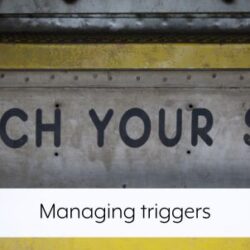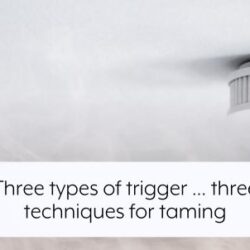
‘It’s horrible being triggered.’
I nod. It’s an understatement. There are no words to describe it. The trigger comes and our bodies and brains surge with the aversiveness of survival: everything tells us to get away. This is dangerous! This is painful! This isn’t good! Get away, get away!
‘Yes, it’s horrible being triggered.’
So she looks at me, like I’ll have the answer. My heart lurches in compassion for her. ‘It’s really horrible.’
She knows that I know. But the question still hangs in the air.
‘We have two choices when we’re triggered,’ I say, but I’m hesitant, because what her eyes are really asking me is for me just to make it not so. To take the triggers away. To stop the surge. To wipe it away with a magic eraser.
‘We can’t stop being triggered, at least not to start with,’ I add, and disappointment skims across her eyes. ‘But what we can do is decide what we’re going to do about it. And there’s only really two things we can do.’
A tiny shimmer of hope in the eyes again. Maybe one of the things will be the magic answer.
‘We can avoid it. We can rearrange our environment so that it never happens.’
She nods, almost excitedly. Yes, yes, avoid it. Stop it ever happening. This sounds promising.
‘We can educate people around us so that they don’t trigger us. We can insist that certain things are off limits.’
Yes, get people to understand.
‘We can avoid the places, the people, the things, the situations, the words, the mental images, the memories that will trigger us.’
Yes. But there’s a tinge of doubt. She senses there’s a catch.
‘But it won’t work all the time.’
I knew it.
‘There are triggers that we don’t know about. We’ll be taken by surprise. And it has a huge cost attached to it. It’s difficult to control our environment and the people in it. It costs us in our relationships. Some people are willing to try not to trigger us, but it’s a tough burden for them to carry: always to be worrying about whether they might get it wrong. It stops them enjoying our company and puts them on edge. Unconsciously, even though they might not mean to, it makes them reluctant to spend time with us. Because they have to be ever watchful. They can’t just hang out with us. They have to look after us and our reactions all the time. All but the most committed people will find that a drag. We’ll limit our relationships.’
Disappointment, and maybe a sullen hint of resentment.
‘That’s tough on us. But it’s tough on them too.’
The resentment is still there.
‘It’s a short-term solution at best. Sometimes it’s necessary while we learn other ways of managing. But it’s no way to live in the long-term.’
A pause stretches out over the sadness in the air.
‘What’s the second option?’
I breathe in deeply. There’s a touch of anxiety. But a touch of fervour too, a curled-up, tense excitement, because I know the cage door will open.
‘We welcome the trigger.’
There’s a look of confusion, then incredulity, then crossness.
‘We welcome it?!’
I’m talking a foreign language, and I know it. I want to back down but also know that I can’t. It’s like taking a perilous track up a mountain-side: don’t look down, keep going, and you’ll soon be swimming in the most spectacular view of your life.
‘Yes. I know it sounds counter-intuitive. Because it is. But if we’re going to change the way our brain works – if we want a solution – then we have to do something different. We have to do something different to what we’re currently doing. Being triggered by triggers isn’t working. It’s not changing things. In fact, it’s reinforcing it …’
‘… But I can’t help it! It just happens! It’s outside my control!’
There is anger in the outburst.
‘I know. Exactly.’
I just wait for the anger to simmer down a little, so that the front brain can hear me.
‘It’s not our fault that we’re triggered. You’re right – we can’t help it.’
She breathes out.
‘But we want to change that, don’t we? We want triggers to stop controlling our life, right?’
‘Right.’
‘So we have to do something that’s counter-intuitive. Triggers are intuitive. Taking control of them is counter-intuitive.’
Her eyes narrow, dubiously. But she’s curious.
‘When we’re triggered, it’s horrible.’ We’re back where we started. ‘And then afterwards, we tell ourselves how horrible it is. While we’re being triggered, we tell ourselves how horrible it is. And more often than not, we beat ourselves up for having been triggered. Right?’
She looks down. ‘Hmm.’
‘We’re frustrated and cross and upset that we got triggered.’
‘Because it’s horrible …’
‘Yes. Right. It’s horrible. And we can’t do anything about it. But …’
She waits, hanging from one hand on this cliff edge.
‘But what we can control is how we react afterwards. We don’t have to beat ourselves up. That IS within our control.’
She looks like she’s about to grasp something, but she’s not there yet. I keep edging forwards.
‘When we beat ourselves up, it reinforces how aversive the trigger is. It sends a message to our brain that what just happened was really bad. Our brain then tags it as extremely unpleasant. Then the next time we’re triggered, we’ve got this memory of recent awfulness layered on top of it. It makes it feel even worse. So we want to avoid it even more. We rearrange our environment, we control the people in it. We try to make sure we’re not triggered. That sends another signal to our brain that triggers are really, really awful – after all, they must be, because we’ve done so much to try to avoid them. So our negative anticipation of them then primes us to have even more of an emotional reaction to them.’
At least she’s still listening.
‘It’s like pain,’ I explain. ‘In studies, if researchers tell participants that they’re about to have an electric shock and that it’s going to really really hurt, that’s exactly how they experience it. They might rate it at 8 out of 10. But if they’re told it’s going to be mild, they rate it as maybe 3 out of 10. Anticipation is everything. We don’t just have the experience we’re having, objectively. It’s all mixed in with what we believe about it. It’s mixed in with what we’re anticipating.’
There’s a slow nod and I can almost hear some gears whirring.
‘When we fear triggers, when we expect them to be absolutely horrible, then they are. It makes our experience of them subjectively worse. So our attitude towards them matters. A lot.’
Another slow nod.
‘But we can change that. We can be more neutral about them. We can say, ‘Oh look, it’s a trigger. It’s just a trigger. That’s all. It’s not very nice, but I can survive it. After all, I’ve survived being triggered a thousand times. I’ll get through it. I’ll get over it. It’s no big deal.’’
She doesn’t look entirely convinced, which isn’t surprising. This is a big shift in thinking.
‘And we can even go a step further than that.’
I might as well go in for the kill.
‘We can welcome triggers. Because triggers are actually there to help us.’
The look on her face says that I have crossed a line. But I plough ahead anyway.
‘Triggers are guides. Triggers tell us what we’ve dissociated. Triggers are clues. Triggers are warnings about what has been dangerous in the past. So they’re vital pieces of information. Every time we’re triggered, we need to work hard to calm ourselves down, to soothe ourselves, to talk ourselves through it. Then we need to be kind towards ourselves and not beat ourselves up. And then we need to do something with this vital information. We need to get our front brain online and sit down and think about and write about and talk about what the trigger was and why our brain is interpreting that thing as representing danger.
‘And then we need to get our brain to think about it. To really think about it. If we’ve been triggered by a plant, why have we? Because the reality is that that plant, that picture, that tree, that colour can’t hurt us. They’re not abusing us. They’re not doing anything to us at all. They’re just reminders. They’re just things that our brain has associated with a prior trauma.
‘So we need to get our brain to notice that it’s an association, but that’s all it is. No-one has ever been abused by a plant. There is nothing intrinsically unsafe about plants. We need to sit our brains down and explain that to them.
‘We need to do something with the information that each trigger gives us. Like we would with a child: we’d sit down with them and talk to them and explain to them that going to the doctor’s might feel scary, but that it’s safe really. We would talk them through it. We’d promise to support them in it. We’d distract them maybe, or we’d reward them at the end of it. We’d make it fun or a challenge or an adventure. We’d explain everything that’s going to happen. We’d give them context.
‘If it were a child with this trigger or fear, we’d most likely go to a lot of effort to reassure them. But for some reason we don’t do that with ourselves. We get triggered and then we just try to avoid the trigger in the future. That’s like saying to the child, ‘Okay, we won’t go to the doctor’s then.’ But we don’t do that because we know that that’s not good for them. They might really need to go. Their health might be at risk if they don’t go. So we work it through.
‘That’s what we’ve got to start doing with ourselves. We have to make use of the information that triggers are giving us, and do some hard work.’
The anger has gone and so has the resentment and so has the doubt. She’s pensive now. She’s trying to take it in.
One final push.
‘It all hangs on what we believe. If we believe that we’re helpless victims of triggers and there’s nothing that can be done about them, then of course they’re going to carry on being horrible and we’ll just have to work hard to avoid them and get people to understand.
‘But if we believe that triggers are giving us vital clues about our trauma, and that we can resolve that trauma … if we believe that our brains can change … if we believe that triggers can be resolved …’
Her eyes are wide, as if she doesn’t know what kind of ‘if’ it is …
‘If we believe that … and we should believe that, because it’s true … triggers can be resolved, trauma can be dealt with, our reactions can change … then we can start to welcome them.
‘We can’t change something if we’re not aware of it. So the fact that we get triggered is a good thing. It’s the first step. It’s our opportunity to become aware of it. It’s a crucial piece of information.
‘So when we’re triggered, yes we have to hang on through it. But then we can welcome it and be glad that it came, because it’s a step forward. It’s a step towards resolving it.’
There’s a long pause while I remember, at last, to shut up.
‘I’ve never believed that I could do anything about triggers,’ she says and she’s pensive again. ‘Therefore I’ve always just wanted to avoid them.’
I remind myself, sternly, to keep quiet.
‘It’s a completely different way of thinking about it,’ she admits. Another long pause. ‘I can’t quite get my head around welcoming triggers. It seems super-weird to think about welcoming something that’s so horrible.’ And then she catches herself. ‘But you’re right, that I’ve bigged them up into being uber-horrible by always thinking of them like that. In reality I have always survived them.’
‘Yes.’ I can’t keep my mouth shut any longer. ‘And you’ve survived far worse. Triggers are a faint echo of the original trauma. They’re nowhere near as bad. You survived the real thing. You’ve already done the most difficult bit. That proves you can do it now. It’s a case of learning to think differently about triggers and starting to soothe yourself when you are triggered, rather than beating yourself up. And talking them down, rather than talking them up.’
‘So a bit like a parent with a child,’ she joins in. ‘If they don’t want to go to the doctor’s, and you agree with them that it’s terrible and scary then that’s going to make it worse for them, isn’t it? Instead, you reassure them. You soothe them. You help them figure it out. You don’t scare them. And I’ve been scaring myself with stories about how horrible being triggered is. But actually I haven’t done anything about them.’
‘And then they become a vicious cycle.’
I think we’re done for now. It’s a new idea and it needs time to sink in. It feels, to both of us, as if our brains have been through a mangle. But it’s a good feeling too.
‘It’s horrible being triggered,’ I say, completing the conversation. ‘But it’s not the end of the world. We can survive it. We can self-soothe. And if we welcome the trigger, we can learn from it. We won’t be triggered forever.’
She breathes out, and so do I.



27 Comments
Accepting our triggers and knowing how to ground ourselves is definitely a must for growth and healing. Thank you!
Love the content of this piece but also the way it brings out the underlying feelings of the ‘counsellor/friend’ as we seek to gently challenge.
wow. just wow. and thank you, thank you, thank you.
Brilliant, layered analysis of a very complex condition that has run my life, till now. I’m so glad I saw this tonight, and can begin putting its ideas to work right away, but with a soothing voice rather than with a harsh one. Thanks you very much fir writing such an insightful and helpful piece.
Aaaaaargh! Why don’t I remember? Why! I am so angry. All I want. All I’ve ever wanted is to remember. I want to know. I NEED to know to heal. (Sorry this post is neither helpful or useful to anybody) ?
Hi Jenny
I have been where you are for such a very long time. I have now disclosed and there was a lot around how I managed to get there, it was complex and involved. For me, it was trust, the child’s trust, actually working with a therapist who sat alongside my child trying to work out what was happening in the here and now and how that connected to my past. But it was also about finding a very safe place in my life, to stop what I was doing and to surround myself with safe tools for survival and to have the silence to listen to the child’s voice. Please don’t give up hope.
Thanks Trina, it really means a lot to me that you say this and that I am not the only one who struggles/ struggled with this. I will keep trying for little me.
I feel the same way. I wish I could help you but I can’t seem to help me. However, I saw a children program Sunday and started to cry while everyone else in the audience were beaming. They were tender towards the sweet children but all I could do was cry and worry about how the children were being treated! I believe, as I remember more that I will face more of the same. Then, the next day I found this article. I have been in therapy 6 years and am just starting to feell. Please be patient, it will happen. Good luck!
Thanks Moana, yes some things just make me uncontrollably sad and heartbroken or very angry and anxious or guilty when the people around me don’t seem to have noticed…it is really encouraging to know that things change and more may become apparent, so thank you for saying that, it is much appreciated.
Sounds like me. Just a few random images of my childhood that don’t feel associated with me, and almost no memories of myself, my parents, my brother or friends and classmates.
Wonderful article one that is both supportive and hopeful for my healing and the healing of others…
Thank you, I love your work❤
Thank you Caroline for explaining in such a clear way what, yes, I didn’t want to hear, but needed to hear. Brilliant work. So informative.
Having survived abuse under 2 years I am rarely triggered but carry an ‘alive yet dead ‘ body experience. I would welcome more triggered emotional responses but only had one at the Children’s Holocaust Museum in Jerusalem 4 years ago. I am grateful for this blog cast but how would the dialogue be with a survivor like me I wonder?
Beautifully put. Thanks Carolyn.
My therapist, talking about flashbacks, not triggers (which are the cause of flashbacks, after all), said, “They are a gift from the unconscious.”
I immediately knew he was right but boy, I wanted to strangle him! And then I laughed.
Thank you so much for this. I really needed to read it today, perfect timing
Just beautiful and compassionate and so helpful. Thank you for all you do and share Carolyn.
Beautiful, helpful, compassionate, heartfelt and honest. Your writings of your recovery continue to inspire and help my recovery and quality of life. Thank you Carolyn.
Learning to accept and welcome triggers is at first difficult to do. However, it is doable and becomes easier over time.
Thank you for putting it out there and in the way you did…my mother in law treated me badly and caused me to fall into a depression and onto the verge of a total nervous breakdown. When I finally got to a therapist I had to do 20 therapy sessions with her using SHIP. She mt m-in-law had triggered my childhood abuse the “orphan” syndrome. I basically had to bring myself up within a family structure. Well I am doing very well as she has taught me to have healthy boundaries up as I was a people pleaser and also I am dealing with my emotions instead of surpressing them.
VERY VERY difficult and scary. So Jenny hang in there and jyst know it does get better and there is
Help out there.. Thank you Carolyn for your blogs. God bless you
Excellent information Carolyn. I avoid being triggered and have done so for many years. I will process this different way of thinking but I realise it will be very scary. However the truth is, avoiding it hasn’t worked at all. What your article has done, though, is given me a different way of viewing the triggers. What was particularly helpful was where you said “and you’ve survived far worse. Triggers are a faint echo of the original trauma.” Brilliant. Thank you.
I can’t bear to hear the angry arguments on “Judge Judy” and I’ve realised that it reminds me of my parents’ arguments, and I need to calm down because there’s nothing relevant to my present life (I’m 78).
Thank you so much for increasing my understanding of how to deal with triggers. Strangely my last trigger was caused by reading the course content of one of your training sessions! I’ve only recently found out about PODS and all this free support you offer. Thank you for sharing your thoughts and experiences of therapy. I’ve been able to celebrate that some one else, some one who’s very eloquent, and another survivor, understands child hood trauma, DIDs, triggers, shame, negativity and how when it’s a choice it’s ok. And most of all by seeing these comments I truly don’t feel alone any more. You’ve told me I can unlock the shame and that I can stop it so there’s even more hope. God bless you Caroline and co survivors. Thank you Thank you Thank you
I couldn’t have put it better myself, except to add more thank yous.
Thank you Carolyn, I was hugely triggered two days ago on hearing a news item about something that was going to be included in the new domestic abuse bill, (the use of strangulation as a means of coercive control.)…..and I’m still feeling emotionally tender after listening to the FKA Twigs interview with Louis Theroux in Jan. I will try this: what I find is that I tip back into hyperventilating at night, ie I wake up hyperventilating, when I have had a bad shock. The hyperventilating started Oct 18, in response to emotional abuse I was being subjected to at that time. I wasn’t able to leave the relationship until the hyperventilation was under control.
Yes, if I see each trigger as an opportunity to self care in the present, and send my 2018 self some love, and my married self who was strangled, maybe it will help healing.
I’m practically speechless – your ability to articulate what seems impossible to explain is such a skill. So powerful. This has helped me enormously – thank you
I am lost for words – your ability to articulate the inexplicable is a remarkable skill. This has been extremely helpful – thank you.